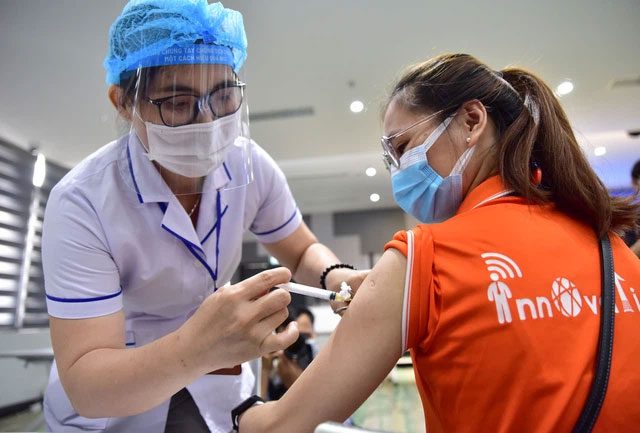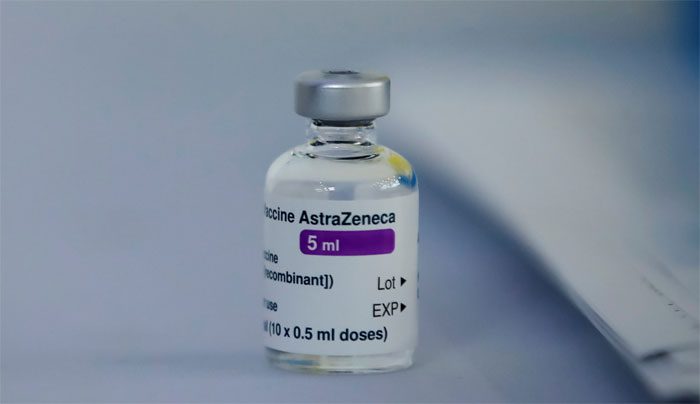According to experts, experiencing reactions after vaccination is a good sign that the body is being protected.
According to updated data from the Ministry of Health, as of August 12, a total of 12,098,821 doses of the Covid-19 vaccine have been administered, including 11,006,121 first doses and 1,092,700 second doses.
Currently, Vietnam has granted emergency use authorization for 6 types of Covid-19 vaccines. Among these, the AstraZeneca vaccine has the highest distribution quantity.
When receiving the AstraZeneca vaccine, many people often express concerns about potential side effects.
According to Dr. Bach Thi Chinh, Medical Director of the VNVC Vaccination Center System for Children and Adults, the World Health Organization (WHO) confirms that the Covid-19 vaccine is safe and effective in protecting the body against attacks, complications, and death caused by SARS-CoV-2 virus.

Vaccination for individuals and staff at the High-Tech Park in Ho Chi Minh City – (Photo by Viet Hung).
Experiencing reactions after vaccination is a good sign that the body is being protected. This means that the vaccine is working and the immune system is responding normally.
Dr. Chinh stated that the side effects following the AstraZeneca vaccine are generally mild to moderate and will resolve on their own within a few days.
- Very common side effects (≥10%): Injection site reactions (local reactions); Increased pain sensitivity; Pain; Heat; Redness; Itching; Swelling.
- Systemic side effects (general reactions): Feeling unwell (discomfort); Fatigue; Chills or fever (uncertain temperature); Headache; Nausea; Joint or muscle pain.
- Common side effects (1-10%): Fever (temperature measured at 38°C/100.4°F or higher).
Dr. Chinh noted: “Monitoring reactions after vaccination for at least 30 minutes at the vaccination site is a principle that must be adhered to after receiving the Covid-19 vaccine, applicable to all types of Covid-19 vaccines, as this is the period when early and severe complications may occur after vaccination, such as anaphylactic reactions.
At the vaccination site, cases of anaphylactic reactions need to be detected and treated early, as well as monitored and treated actively at medical facilities.
Once at home, vaccinated individuals should self-monitor for 7-28 days to detect any signs of anaphylaxis and go to the nearest medical facility for timely intervention.”
The AstraZeneca vaccine’s composition includes an active ingredient and excipients, allowing the vaccine to be administered via injection. The vaccine does not contain preservatives, and the excipients play a role in stabilizing the vaccine (preventing it from changing).

Experiencing reactions after vaccination is a good sign that the body is being protected.
Dr. Chinh stated that AstraZeneca is a new vaccine, so there hasn’t been enough time to confirm how long the protection lasts. According to recommendations, the Covid-19 vaccine from AstraZeneca should be administered in two doses.
“With the dangerous variants of the SARS-CoV-2 virus currently, it is essential to receive both doses of the AstraZeneca Covid-19 vaccine to prevent the virus from entering the body,” Dr. Chinh said.
The Ministry of Health advises that not everyone will have the same immune response. With most vaccines, the protection rate is never 100% absolute. Therefore, there is still a risk of infection for those who have been fully vaccinated against Covid-19.
Dr. Chinh emphasized: “After receiving the vaccine, whether it is one dose or both doses, vaccinated individuals must strictly adhere to infection prevention measures according to the 5K message from the Ministry of Health, which includes: Masks – Disinfection – Distance – No gatherings – Health declaration and vaccination.”



















































